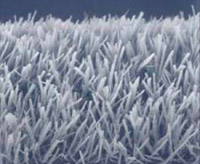Nano-Material May Revolutionize Solar Panels and Batteries
 We are registering good progress in the field of alternative energy. Scientists and researchers are working tirelessly to come up with newer and better alternatives to fossil fuels. Scientists are also trying to apprehend the future problems related with clean and green fuels, for example, cleaning of windows and solar panels and expanded battery storage capacities for the next electric car. Nature Nanotechnology has just published the New Tel Aviv University research. The research findings deal with a breakthrough in assembling peptides at the nano-scale level that could make these futuristic luxuries come true in the coming years.
We are registering good progress in the field of alternative energy. Scientists and researchers are working tirelessly to come up with newer and better alternatives to fossil fuels. Scientists are also trying to apprehend the future problems related with clean and green fuels, for example, cleaning of windows and solar panels and expanded battery storage capacities for the next electric car. Nature Nanotechnology has just published the New Tel Aviv University research. The research findings deal with a breakthrough in assembling peptides at the nano-scale level that could make these futuristic luxuries come true in the coming years.
To see how Klean Industries is producing high grade nano materials cost effectively please click here.
Prof. Ehud Gazit in TAU’s Department of Molecular Microbiology and Biotechnology is working with his graduate student Lihi Adler-Abramovich and a team. They are taking samples of peptides in the range of 100 nanometers (roughly one-billionth of a meter) and even smaller. They are devising a novel way to manipulate the atoms and molecules of peptides so that they “grow” to remind you of small forests of grass. The specialty of these “peptide forests” is to repel dust and water. So they are creating a perfect self cleaning coating for windows or solar panels. Why such hue and cry over self cleaning? Because dirt and dust play with the efficiency of the solar panels and gadgets.
Adler-Abramovich, a Ph.D. candidate, narrates the journey, “This is beautiful and protean research. It began as an attempt to find a new cure for Alzheimer’s disease. To our surprise, it also had implications for electric cars, solar energy and construction.”
Peptides are inexpensive like a sweetener in your soda.
Prof. Gazit is a force to reckon with in the field of nanotechnology research. He has been working hard for the past six years creating arrays of self-assembling peptides made from proteins. He is working in close association with a group led by Prof. Gil Rosenman of TAU’s Faculty of Engineering. They are tackling the problem of new applications for this basic science for the last two years.
The team is also taking help of a variety of peptides for developing “self-assembled nano-tubules” in a vacuum under high temperatures. These peptides are simple and inexpensive. They cost you as much as the artificial sweetener aspartame. These nano-tubules can bear extreme heat and are resistant to water.
Adler-Abramovich shares her excitement about the project, “We are not manufacturing the actual material but developing a basic-science technology that could lead to self-cleaning windows and more efficient energy storage devices in just a few years. As scientists, we focus on pure research. Thanks to Prof. Gazit’s work on beta amyloid proteins, we were able to develop a technique that enables short peptides to ‘self-assemble,’ forming an entirely new kind of coating which is also a super-capacitor.”
Nano-tech material can also exhibit the property of a capacitor with extraordinarily high energy density. This property can be exploited for providing the existing electric batteries a boost. This will help in surmounting the limitations of the electric cars. This necessary thrust can help in starting an electric car. Climbing a hill or bypassing other cars and trucks on the highway can be achieved with perfect ease with this extended boost. Adler-Abramovich explains, “Our technology may lead to a storage material with a high density. This is important when you need to generate a lot of energy in a short period of time. It could also be incorporated into today’s lithium batteries.”
Window Cleaner might become a thing of the past?
If the current project becomes successful, the sealed outer windows of skyscrapers may never need to be washed again. The TAU lab’s material can fend off rainwater, as well as the dust and dirt. The efficiency of solar energy panels could be improved too as a rain shower would pull away any dust that might have accumulated on the panels. It will culminate into saving money on maintenance and cleaning. Most of the solar farms are being established in desert areas so cleaning the panels poses a huge problem.
You can return to the main Market News page, or press the Back button on your browser.

